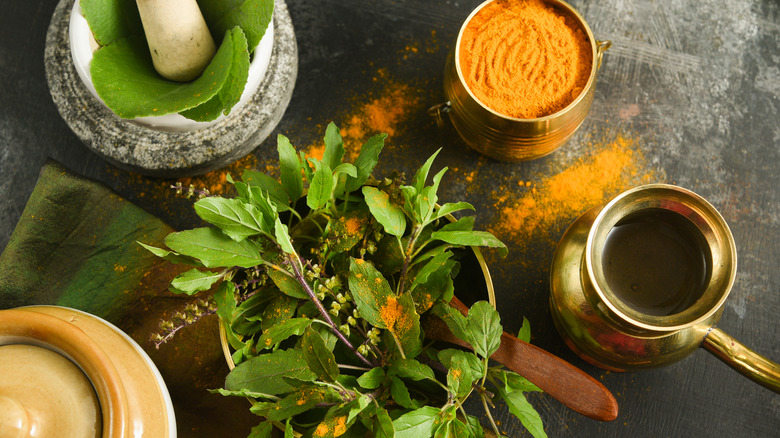What Is Ayurvedic Medicine And Is It For You?
Ayurvedic medicine, also known as Ayurveda, is an ancient holistic (whole-body) healing system developed in India some 3000 years ago (per WebMD). The word Ayurveda is made up of the Sanskrit words "ayus" (life) and "veda" (science or knowledge) which translates to "the science of life." Ayurvedic medicine is focused on promoting health rather than fighting disease, by maintaining harmony between the body, mind, spirit, and the environment (via Hopkins Medicine).
Ayurveda has long been considered a form of medical care in India. A 2018 study published in Progress in Preventive Medicine reported that India has more than 700,000 registered practitioners of Ayurveda. In the United States, Ayurvedic practitioners are not licensed but in 2019 about 240,000 American adults were using Ayurvedic medicine (per The National Center for Complementary and Integrative Health (NCCIH).
According to The Ayurvedic Institute, Ayurveda encourages good health through maintaining a balanced inner state according to your physical, mental, and emotional characteristics, that is, your individual constitution. Many external and internal factors can disrupt this balance and lead to illness or disease.
The body's three life forces
Ayurveda is based on the belief that every person is made of the five elements of nature: earth, water, fire, air, and ether (space), per WebMD. Combinations of these elements form three life energies, or doshas, inside every one of us. Each dosha controls a different body function, and in each of us, one dosha is usually stronger than the other two.
The Vata dosha (air and space) provides the essential motion for all bodily processes, according to The Ayurvedic Institute, and controls breathing, blood flow, heart function, bowel movements, and the division of cells (per WebMD). Activities and conditions that can disrupt this dosha include eating too frequently, staying up too late, worry, fear, and grief. Such disruptions could cause asthma, arthritis, or anxiety.
The Pitta dosha (fire and water) governs the body's metabolic activity and homeostases such as body temperature, digestion, and food conversion to energy. If sour, salty, or spicy foods make up too much of your diet, you might be disrupting your Pitta dosha and setting yourself up for infections or conditions like Crohn's disease, heart disease, and high blood pressure (via WebMD).
The Kapha dosha (earth) is considered the energy of lubrication (per The Ayurvedic Institute). It controls muscle growth, physical strength and stability, weight, and the immune system. Habits that can disrupt it include sleeping during the day and consuming too many sweets or salty foods or too much water. When this dosha is out of balance, you may develop asthma, nausea after eating, diabetes, and obesity.
What can Ayurvedic medicine treat?
Ayurveda treatment typically includes a special diet, herbal remedies, massage therapy, yoga, and meditation. Ayurvedic practitioners may also perform extensive blood-cleansing therapies to get rid of toxic build-up and purify your body (via Hopkins Medicine).
Studies show that Ayurvedic treatment may have promising benefits for finding relief from various diseases such as diabetes, asthma, arthritis, cholesterol, and blood pressure. According to a 2012 study published in Evidence-Based Complementary and Alternative Medicine, scientists stated that since there are many similarities between the gene structures of cancer and digestive ailments, it's also possible to find Ayurvedic curative solutions to cancerous growths by treating gastrointestinal issues.
Additionally, a 2022 study published in The Journal of Ayurveda and Integrative Medicine explored a case where a woman was diagnosed with amonherrea-induced infertility. After being treated with Ayurvedic treatments like blood purification, the mother finally delivered a baby girl following a healthy 8-month pregnancy. In short, you may choose Ayurvedic treatments for healing but it's vital to remember that they are not a substitute for modern medicine.



